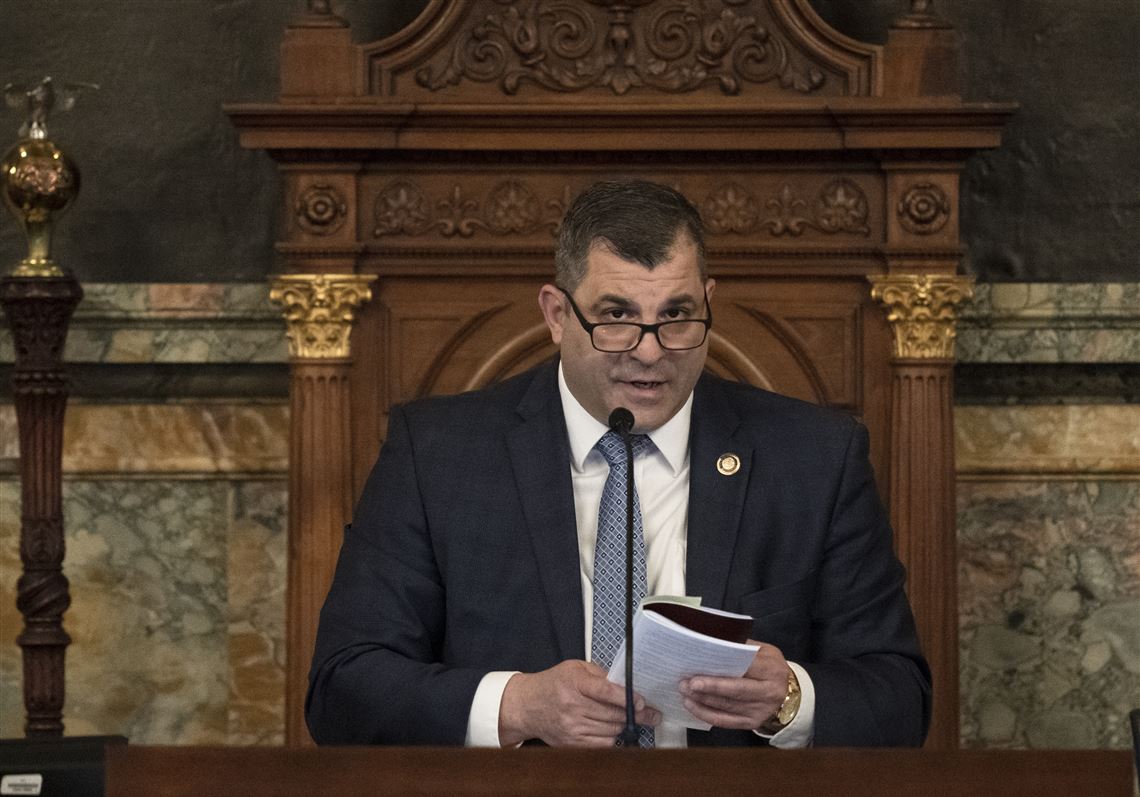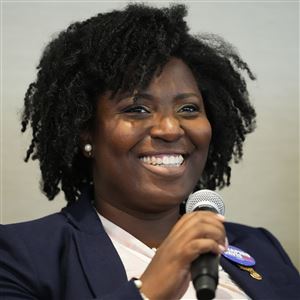HARRISBURG — The Pennsylvania House returned to bitterly partisan form Tuesday after a six-week hiatus, as Democrats used their first majority in more than a decade to start a special session focused on a constitutional amendment allowing lawsuits by survivors of childhood sex abuse.
What started as a genial, bipartisan welcome for three newly elected Democratic members from Allegheny County — state Reps. Abigail Salisbury, Joe McAndrew and Matthew Gergely — devolved into contentious partisan bickering over rules for the special session. There were accusations of stalling, stifling debate — and some shouting.
Ultimately, Democrats flexed their newly won majority muscle. After three vacancies to start the year created a period of legislative limbo, the swearing-in of the three Allegheny County lawmakers finally gave Democrats 102 members in the 203-seat chamber, the narrowest of majorities. With two Republicans absent, they passed the rules in a 102-99, party-line vote.
It was the first day of legislative activity in the chamber since Jan. 9, when the special session called to move the long-languishing proposed constitutional amendment ground to a halt because members couldn’t agree on basic House rules. The amendment would open a special window for lawsuits that would otherwise be outside the statute of limitations.
House Speaker Mark Rozzi, D-Berks — who emerged as a compromise speaker last month after the vacancies left Democrats without the votes to elevate their caucus leader — subsequently named a six-member work group to come up with rules. With Harrisburg in gridlock, he eventually took that group on a “listening tour” across the state. On Tuesday, two of those members remained divided when they spoke about their work to the full House.
State Rep. Pete Schweyer, D-Lehigh, said the rules were devised over a period of weeks and included “honest conversations,” which he called “something that doesn’t happen up here as often as it should.” The rules, he said, would allow the House to quickly address the constitutional amendment.
State Rep. Paul Schemel, R-Franklin, another member of the work group, blasted the rules as a way to “freeze the minority” of 101 Republicans. Mr. Schemel shouted that he vehemently opposed the rules, which he said were “the will of a tyrannical majority of one” — an apparent reference to Mr. Rozzi.
The special session got underway after adoption of the rules, with a five-member committee moving to a smaller meeting room to consider legislation, including a bill that contains the proposed constitutional amendment (voters would still have to approve the amendment in a direct referendum later this year).
The committee itself was a flashpoint in the earlier debate. The rules gave two seats to top Democrats, two to top Republicans, and the chairman’s position to State Rep. Tim Briggs, D-Montgomery, a 14-year House veteran.
The bill with the proposed constitutional amendment passed 5-0 in the committee and was returned to the full House, where it must be considered on two more special session days before it wins full approval.
Tension in the House has run high ever since mid-November, when the results of the midterm elections made clear Republicans had lost their long-held majority. But two elected Democrats resigned after winning higher office and a third who won reelection had died shortly before Election Day.
That meant Republicans had a temporary majority but the surefire prospect of losing it soon because the three vacant seats represented heavily Democratic districts in Allegheny County.
A power struggle ensued.
It came to an emphatic end Tuesday — at least for now.
While Mr. Rozzi retained his grip on the speakership Tuesday, it remains to be seen whether he will be able to stay in that position now that Democrats have their full majority. It is possible some will push to replace him with State Rep. Joanna McClinton, D-Philadelphia, the majority leader.
Ms. Salisbury, Mr. McAndrew and Mr. Gergely were sworn in by U.S. Magistrate Judge Susan Schwab. They were welcomed with a round of applause and comments from both Ms. McClinton, who became House majority leader with their arrival, and House Minority Leader Bryan Cutler, R-Lancaster.
Ms. McClinton noted they were among 52 freshman members in the chamber. She told them they won’t always agree on issues, but that they can look forward to “making history together” by taking action on the constitutional amendment.
Mr. Cutler noted he was part of a group of 50 new lawmakers when he joined the chamber in 2007. He told new members they “will kind of travel as a group” through “meet and greets” and other functions, but that eventually they will see their colleagues take votes that don’t make sense to them. The reasons for those votes, Mr. Cutler said, can be tied to party, geography, personal interest or other factors.
But Mr. Cutler said he believes lawmakers “have way more in common” than some observers might think.
The next few hours saw a series of 102-99, party-line votes leading up to the one in which the rules for the special session were passed. A particularly thorny one was a resolution from Democrats that would prevent amendments to the rules.
State Rep. Ryan Mackenzie, R-Lehigh, said Mr. Rozzi’s speakership had started with “grandiose ideas” of a new and nonpartisan way of doing business, but that preventing amendments was “setting a bad precedent for the future of this session.”
He asked if the idea of prohibiting amendments was brought up voters during Mr. Rozzi’s listening tour. Mr. Schweyer said he attended or listened to all those sessions, and that what the public wanted was passage of the measure to help childhood sex abuse victims.
The message, Mr. Schweyer said, was, “Can the Legislature please stop with the antics?”
Ford Turner: fturner@post-gazette.com
First Published: February 21, 2023, 9:49 p.m.
Updated: February 22, 2023, 1:15 p.m.


















